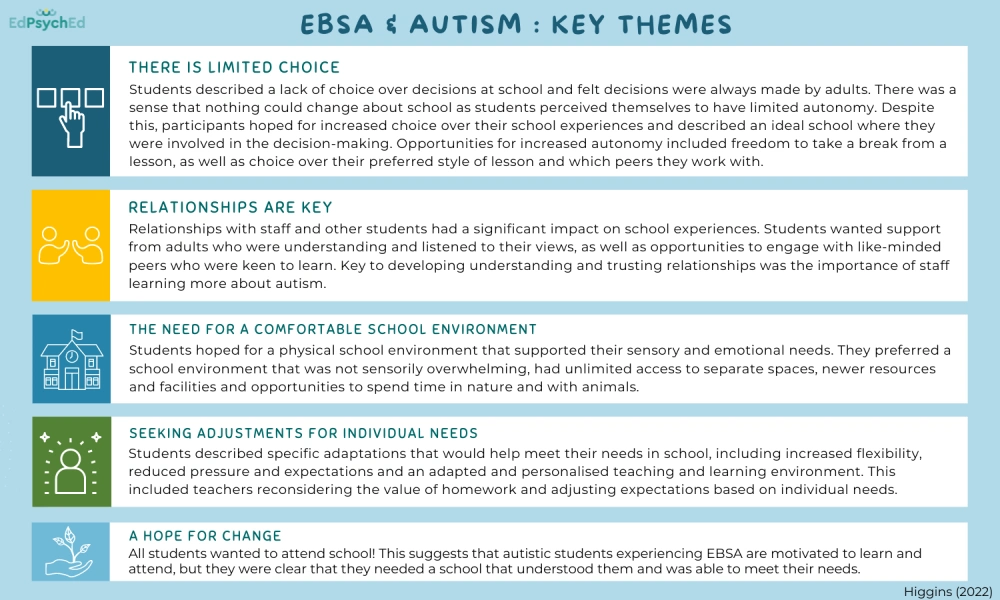Sharing EP Practice: EBSA and Autism - What Can Schools Do?
Apr 19, 2023
Dr Mollie Higgins, Educational Psychologist, shares the key themes and outcomes of her doctoral research around Autistic Young People experiencing Emotional Based School Avoidance (EBSA). Mollie has been working alongside Dr Jerricah Holder to create a new chapter for the EBSA Horizons EP Course - Supporting Autistic CYP experiencing EBSA. To be released early next year. Sign up here to access the course.
The Ideal School: EBSA and Autism
In addition to the risk factors for EBSA, autistic young people experience a number of differences which further increase their feelings of anxiety within the school environment. These include:
- Differences in identifying and describing their own and others’ emotions
- Emotional regulation difficulties
- Differences in sensory processing and finding the sensory environment overwhelming e.g. loud corridors, different smells, busy classrooms
- Difficulties understanding and predicting social situations and managing interactions with others
- Worries around change or transitions e.g. moving between classrooms, changes to timetables, supply teachers
- Executive functioning and organisation difficulties – remembering books, homework, equipment
- Masking - try to ‘fit in’ or attempting to appear more neurotypical by changing their behaviour and internalising any anxiety
- Experiencing performance anxiety related to the schoolwork or exams
These challenges mean that some autistic students try and manage their anxiety by avoiding school altogether. This is reflected in statistics which show higher levels of EBSA amongst autistic students (Department for Education, 2021). I felt it was important to speak with students directly to hear their views and opinions about what might help them attend school.
I asked ten autistic secondary-age students to describe the best school ever and the worst school ever. This technique is known as The Ideal School [1] and is based on Personal Construct Psychology. By asking students to describe their ideal and non-ideal schools, I was able to understand the type of adjustments that would help these students feel more able to attend school.
Five key themes were identified from the data and the key points are summarised below:

So What Can Schools Do?

[1] This technique was adapted by Williams and Hanke (2005) using Moran’s (2001) Drawing the Ideal Self.
FOR SCHOOLS:
EBSA Horizons School Staff Training
EBSA Horizons School Training is a comprehensive CPD course for School Staff, which develops understanding and skills (alongside a lot of resources) to support children and young people experiencing difficulties attending school. This course has recently been updated with a new chapter.
Find out more about EBSA Horizons School Training here and register your interest to receive 3 FREE resources from this course.
Family Horizons: Nurturing School Engagement and Wellbeing
Family Horizons offers parents and carers on-demand access to practical strategies, knowledge, and tools across five carefully structured chapters. From understanding attendance challenges to supporting anxiety and promoting family wellbeing, the course brings together professional expertise with real family experiences.
Find out more about Family Horizons here.
FOR PROFESSIONALS:
EBSA Horizons Professionals CPD
EBSA Horizons is a comprehensive CPD course for EPs and other professionals who support schools, which develops understanding and skills (alongside a lot of resources) to support children and young people experiencing difficulties attending school. This course has been recently updated with new chapters.
Find out more about EBSA Horizons here and register your interest to receive 3 FREE resources from this course.
FOR LOCAL AUTHORITIES & MATS:
EBSA Horizons Partnership Framework
A Local Authority wide Emotionally Based School Avoidance (EBSA) initiative to improve attendance and wellbeing in schools.
Providing training and resources for all LA professionals, school staff and parents/carers.
Find out more about the EBSA Horizons Partnership Framework here.
Stay connected with news and updates!
Sign up to receive updates, resources, inspiring blogs and early access to our courses.
Don't worry, your information will not be shared.





